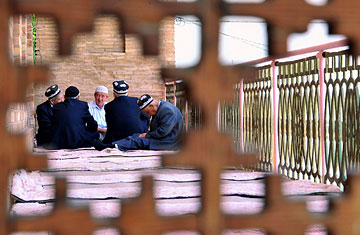
Kyrgyz men converse at a Mosque in central Osh, Kyrgyzstan's second largest city, on May 15, 2009
(2 of 2)
That translates into a somewhat depressing reality for the over 50 million people living in the region. The world's "freedom rankings" compiled by Freedom House, a Washington D.C.-based human rights NGO, place all five of the post-Soviet 'Stans near the bottom. Independent media is almost non-existent. Human rights activists are frequently detained and tortured, and many others live in exile. Even in Kyrgyzstan, where a so-called "velvet" revolution toppled the ruling president in 2005, the subsequent government has done little to distinguish itself from the past. "Central Asians tolerate an awful lot," says Roberts. "They've inherited a mentality from the Soviet days where they don't necessarily believe in politics, or have faith that turning over the government yields a lot of results."
Yet they are hardly isolated from global events: the impact of the worldwide recession is pushing some Central Asian societies to the brink. Tajikistan, like other poor Central Asian nations, has over the years seen many of its able-bodied men leave to work in the more prosperous cities of Russia and oil-rich Kazakhstan — at least a tenth of the Tajik population of 7 million is migrant labor. Remittances sent home comprise some 40% of the country's total GDP, according to UN figures, and account for only slightly less in Uzbekistan and Kyrgyzstan. Now, with the collapse of the Russian economy and the drying up of its construction boom, tens of thousands are returning to rugged homelands that offer few opportunities and to families that depended on their labor abroad. Observers in Tajikistan tell of depressed village after village where groups of unemployed men amble around. The situation "is a potential time bomb," says the International Crisis Group, a Brussels-based think-tank, in a report earlier this year that labeled the country "on the road to failure."
Analysts fear that the deteriorating economic climate, a legacy of ineffectual governance, and an increasingly frustrated population may feed into the designs of established militant groups in the region. The Ferghana Valley, the most densely populated pocket of Central Asia, straddles the Uzbek, Tajik and Kyrgyz borders, and is home to the al-Qaeda-linked Islamic Movement of Uzbekistan (IMU), a State Department listed terror organization. Militants are known to slip easily across the porous 1,300 km boundary between Tajikistan and Afghanistan, which is also a chief thoroughfare for Afghan opium into the markets of the West. According to Pakistani media, the IMU has helped contribute some 4,000 Uzbek and Tajik fighters to the Taliban forces warring with Islamabad.
The specter of an Islamist threat has often worked in favor of the region's governments. After 9/11, U.S. Central Asian strategy was dictated largely by the Department of Defense under Donald Rumsfeld. Uzbekistan, ruled its entire independent life by the iron-fisted Islam Karimov, was brought into the fold as a staging ground for American operations in Afghanistan, as well as a willing accomplice in the renditions of suspected terrorists. That cozy partnership ended in 2005 when the Uzbek army gunned down hundreds of civilians protesting for reform in the Ferghana Valley under the pretense that it was curbing an Islamist revolt. U.S. and European condemnation only led the government to turn to Moscow's embrace and throw out numerous international NGOs and foreign aid agencies. The country's dissidents receded further into the margins; the more pronounced opposition now tends to be radical and violent. "Islamic militancy here," says McGlinchey, "has almost always more to do with the oppressiveness of the local governments than some kind of trans-national religious calling."
With the anticipated loss of Manas air base in Kyrgyzstan, the U.S. has again turned to Karimov's Uzbekistan for logistical assistance. Central Asia watchers in the U.S. say that part of the difficulty Washington now faces in the region stems from its own short-sightedness in engaging governments there. "The U.S. approach was one-dimensional," says Mankoff of the Council on Foreign Relations. "A lot of attention has been paid to cooperating with military and security forces at the expense of a broader relationship." The Obama administration has no dedicated Central Asia envoy nor is it willing to pursue a strong agenda for change and reform at the risk of provoking Moscow. "Many think it's a battle not worth fighting," says Roberts.
Events may soon outpace that calculus, given the alarming collapse of the region's economies and spikes in militant violence. It's unclear, though, what a beefed-up American role in the region could look like, and whether it would be in concert — or at odds — with Moscow or Beijing. Headlines in the international press tout the advent of the new "Great Game" in a region that for centuries has been at the whim of larger forces. Not many locals are that interested, though. "We waited and hoped for democratic change after the influence of America," says Umida Niyazova, a journalist and prominent Uzbek activist living in exile in Germany. "But the years since have only brought more instability."
